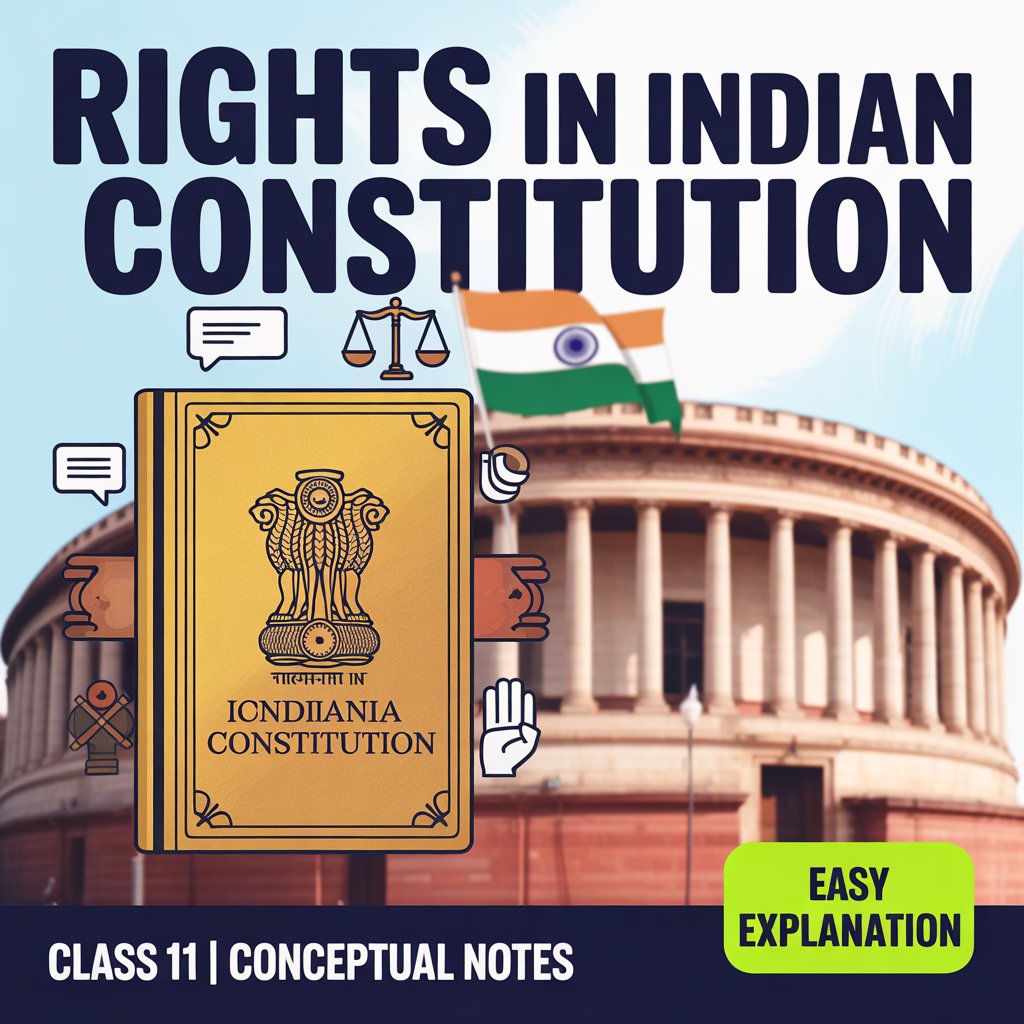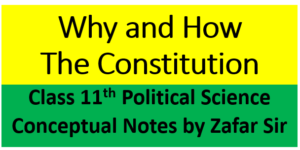
Rights
Rights are those conditions of social life without which no human being can develop himself rights are those rights which are common man needs to live his life which he demands the facilities provided by law protect the rights.
Declaration of Rights
In most democratic countries the rights of citizen are listed in the constitution such a list is called declaration of rights the demand for this was raised by Nehru Ji in 1928.
Why do we need fundamental Rights
Fundamental rights are essential for the basic development and all-round development of a person they help in bringing equality, freedom, fraternity, economic and social development in the society .
National Human Rights Commission-NHRC
National Human rights commission was formed in 2000 its members are a former chief justice of the supreme court and former chief justice of High court and two members having knowledge or practical experience in relation to human rights
Function
- Hearing complaints , investigating and providing relief to the victim
Fundamental rights in the Indian Constitution
During India’s freedom movement the demand for civil rights was raised from time to time by revolutionaries or freedom heroes even in 1928 the Motilal Nehru committee had raised the demand political relation of rights then after Independence , most of these rights are listed in the Constitution.
General Rights
Those Rights which are implemented with the help of Ordinary Loss and the Parliament can make changes in these rights by making Laws
Fundamental Rights
Those rights which are listed in the constitution and for which special provisions have been made for implementation the constitution itself guarantee and protest them to make changes in these rights the constitution has to be amended no part of the government can do anything against the fundamental rights
Note
- India’s second inspiration for fundamental rights from the constitution of America
- Article 12 of 5 of Part 3 of the constitution contain descriptions or mention of fundamental rights
Types of Fundamental Rights
Note
- The original constitution mentioned 7 fundamental rights but by the 44th constitution amendment in 1978 the fundamental rights to property was abolished and it was established as a common law write in article 300 (I)
The Six Fundamental rights described in part of 3 of the Indian Constitution are as follows
- Right to Equality (Article 14-18)
- Right to Freedom (Article 19-22)
- Right against Exploitation (Article 23-24)
- Right to religious freedom (Article 25-28)
- Related to culture and education (Article 29-30)
- Right to Constitution remedies (Article 32)
Right to Equality
Article 14
- Guarantee of Legal Equality and equal Legal Protection without discrimination
Article 15
- Government established of a discrimination free society on the basis of religion, cast , gender and place of birth
Article 16
- Equality of opportunity in Public Appointments
Article 17
- Evolution of untouchability from society
Article 18
- Ban on Titles other than military and education titles
2. Rights to freedom
Article 19
- Freedom speech and expression to form associations to hold meetings to travel throughout India to settle in any part of India and to do any profession freely
Article 20
- To Provide protection to a person accused or punished for crime
Article 21
- No Person can be deprived from the freedom to live except true legal process
- Article 21A RTE 2002 86 Constitution amendment fundamental right to education free and compulsory education from 6 to 14th years of age
Article 22
- To provide protection to any citizen from arrest and detention in special cases
Note
- Right to education was added to article 211 by the 93rd amendment 2002
3. Right against Exploitation
Article 23
- Provision for forced labor bonded labor by human trafficking and use of force when India became independent slavery and fourth level where prevalent in many parts of India the landlords used to make the farmers work but did not pay wages especially women are about to sold like animals
Article 24
- Provisions of children in mine factories and hazardous work
- According to these children below the age of 14 years will not be employed in any risky work such as in mines factories etc.
4. Right to Religious freedom
Article 25
- Right to believe follow and propagate one’s own religion
Article 26
- Right to established institutions doing religious and charitable work as an organized unit
Article 27
No one will be forced to pay tax for the propagation of religion and maintenance of religious sects
Article 28
- No religious education will be given in any government education association
5. Rights related to culture and education
Article 29
Give the citizens of any state of India the right to maintain their special language script or culture
Article 30
Under the linguistic and religious minorities are given the right to established education institutions and run their administrations
6. Right to Constitutional remedies
Article 32
The father of the constitutions Dr. Ambedkar has called this right the heart and soul of the constitution under these the country issues many special others which are called writs
- Habeas corpus
- Mandamus
- Prohibition
- Quo-warrant
- Induction
Habeas corpus
The Order given by the court to an arrested person to appear before the court/ judge is called habeas corpus
Mandamus
Under these if any public official does not perform his duties then the court can order him to perform his duties
Prohibition
Under these the supreme court or the high court can be asked to postpone the hearing of any case in the lower or subordinate courts
Quo Warrant
Quo warrant means what is your authority this writ is a suit when a person works on public post without any authority then the court obtains information about his authority through this writ if the court is not satisfied with the answer of the person , then the court can stop him working
Induction
Under this a writ of certiorari is issued by the supreme court or the high court to cancel the order issued by a subordinate court tribunal or quasi-judicial authority
Constitutions of South Africa
The Constitution of south Africa came into force in December 1996 when the country was facing the threat of civil war after the removal of the apartheid government the declaration of rights in South Africa is the foundation of democracy
Major Rights listed in the Constitution of South Africa
- The Right to dignity
- Right to Privacy
- Right to fair labor treatment
- Right to health environment and environmental protection
- Right to adequate housing
- Right to help facilities food water and social security
- Child rights
- Rights to basic and higher education
- Right to obtain information
- Right of cultural religious and linguistic communities
What are the directive principles of state policy
In Independent India many rules were needed in addition to fundamental rights to bring equality among all citizens and ensure welfare to all under the directive principles of a state policy such policy instructions have been given to the government which can not be challenged in the court but the government can be requested to implement them it is the responsibility of the government to implement them to the extent it can
There are three main things in the list of major policy directly principles
- The Goals and objectives that we should accept as a society
- Those rights which citizens should get in addition to the fundamental rights
- policy is that the government should accept
Fundamental Duties of Citizens (Our Moral Responsibilities )
- In 1976 the 42nd constitution amendment included the list of fundamental duties of citizens article 51A
- Under these the 10 fundamental duties of citizens are its follows
- To avoid by the constitutions and respect the national flag and the national anthem
- To cherish and follow the high ideals which inspired the national movement
- To protect the Sovereignty unity and negative of India
- To be ready to defend answer the nation
- Conserve the national environment
- Develop the scientific outlook humanism and sprit of acquiring knowledge and reform
- make public property safe make swatch Bharat Abhiyan success and stay away from violence
- Strive to move towards excellence and all spheres of Individual and collective activities
- Relation between directive principles and fundamental Rights
- Both Complement each other while fundamental rights import restrictions on some actions of the government the rightly principles inspire it to do some actions
- fundamental rights specially protect the rights of the Individual while the directive principles of a state policy talk about the welfare of the entire society
- Differences between directive elements and fundamental Rights
- Fundamental Rights are Legal support but Policy Directly principles do not have legal support that is you can go to court in case of violations of Fundamental Rights but can not go to court in case of violations of policy directive principles
- Fundamentals rights are related to individuals and it principles related to Society
- Fundamentals rights have been achieved that its principles have not yet been implemented
- The aim of fundamental rights is to establish political democracy in the country and the aim of 30 principles is to establish social and economic democracy
- Fundamental rights promote the welfare of the individual principles promote the welfare of the community
Bonded labor
landlord money lenders and other is people made their poor work as labor for generations now it has been declared a crime




